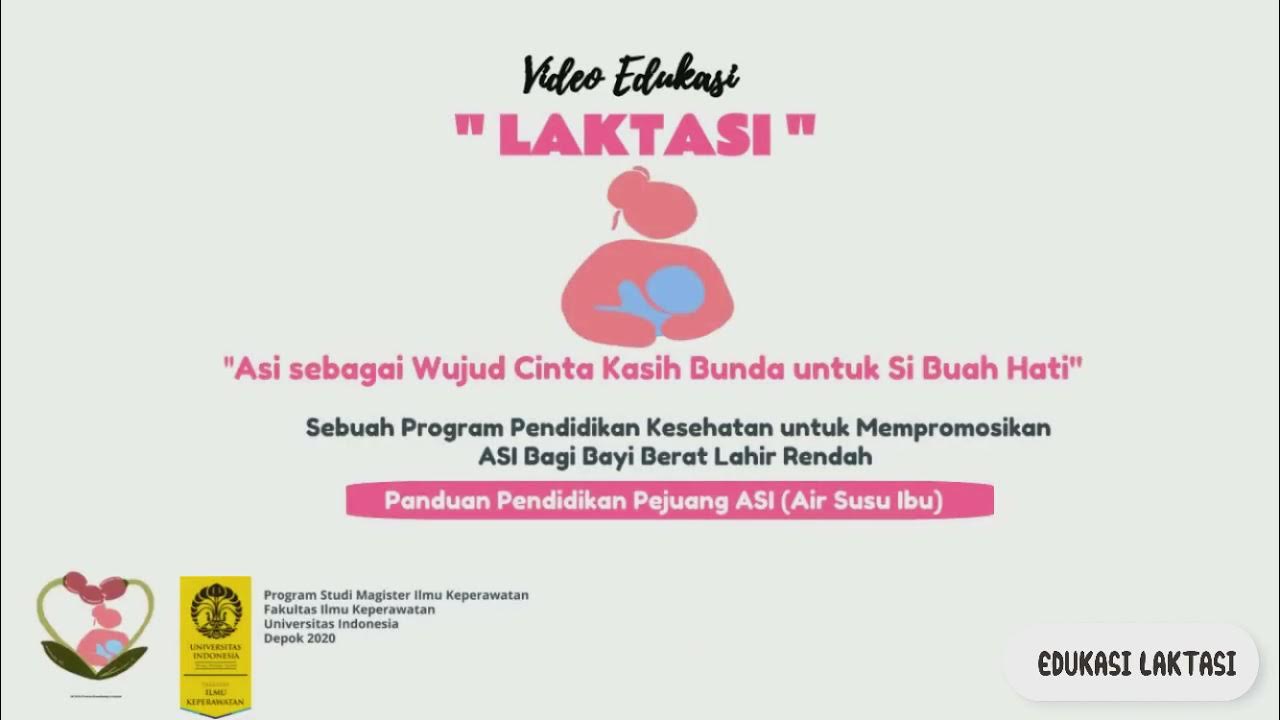Mengapa ASI Itu Penting?
Summary
TLDRThis video delves into the miraculous benefits of breast milk (ASI) for both babies and mothers. It explains the science behind how breast milk is produced and its nutritional superiority over formula, including its role in brain development and immunity. The video highlights the three stages of ASI: colostrum, transitional milk, and mature milk, emphasizing the critical importance of exclusive breastfeeding for the first six months. It also addresses the challenges faced by working mothers and societal barriers to breastfeeding. Ultimately, the video calls for greater support and policy changes to ensure all babies receive the best start in life.
Takeaways
- 😀 Breast milk (ASI) is crucial for an infant’s health, providing essential nutrients and hydration during the first six months of life.
- 😀 Breastfeeding involves two key hormones: prolactin, which stimulates milk production, and oxytocin, which helps release the milk.
- 😀 Colostrum, the first milk produced after birth, is thick, yellowish, and rich in antibodies that protect the baby from infections.
- 😀 Transitional milk appears in the first few weeks after birth and is higher in calories and fats than colostrum.
- 😀 Mature breast milk is primarily made up of water (90%) and contains the right balance of proteins, carbs, and fats for baby growth and hydration.
- 😀 Babies who are breastfed have a reduced risk of diseases such as asthma, obesity, ear infections, and diabetes later in life.
- 😀 Breastfeeding also offers health benefits to mothers, such as a lower risk of breast cancer, ovarian cancer, and diabetes.
- 😀 Mothers who breastfeed can burn between 500 and 700 calories per day, equivalent to an hour of jogging.
- 😀 Only 42% of infants in Indonesia are exclusively breastfed for the first six months, and many mothers face challenges in breastfeeding due to societal pressures and lack of workplace support.
- 😀 Breastfeeding should be the sole source of nutrition for babies during the first six months, but exceptions exist, such as mothers who are HIV-positive or use illegal drugs.
- 😀 Societal and workplace policies need to be improved to support breastfeeding mothers and ensure that babies receive the best possible start in life.
Q & A
What are the benefits of breastfeeding for babies?
-Breastfeeding provides essential nutrients and antibodies that protect babies from infections and diseases. It also supports cognitive development, reduces the risk of conditions like asthma and obesity, and lowers the chances of ear infections and diabetes.
How does breast milk contribute to a baby’s cognitive development?
-Research has shown that babies who are breastfed tend to have higher IQs compared to those who are fed formula milk. This is because breast milk contains nutrients that support brain development, including essential fats and proteins.
What is the process of breast milk production in a mother’s body?
-Breast milk production starts with the stimulation of nerves in the mother’s breast, which sends signals to the brain to release two hormones: prolactin and oxytocin. Prolactin helps produce milk, while oxytocin causes the milk to be released from the breast into the baby’s mouth.
What are the three stages of breast milk and how do they differ?
-The three stages of breast milk are colostrum, transition milk, and mature milk. Colostrum is the first milk produced and is rich in antibodies and nutrients. Transition milk lasts for 2-4 weeks and contains more calories and fat. Mature milk is produced after this period and is primarily composed of water, with a smaller percentage of protein, carbs, and fat.
How often do newborns need to breastfeed?
-Newborns need to breastfeed approximately every two hours. This frequent feeding is essential to meet their nutritional needs and promote healthy growth and development.
Can breastfeeding help mothers lose weight?
-Yes, breastfeeding helps mothers burn between 500 and 700 calories per day, which is roughly equivalent to an hour of jogging. This can assist mothers in losing some of the weight gained during pregnancy.
Is breast milk better than formula milk?
-Breast milk is generally considered superior to formula milk because it contains the right balance of nutrients, vitamins, and antibodies, which formula cannot replicate. Breast milk also supports better digestion, brain development, and immunity.
What are the risks associated with formula feeding?
-Formula feeding may lead to a higher risk of infections, allergies, and other health issues because it lacks the antibodies found in breast milk. It may also contribute to higher rates of childhood obesity and other long-term health problems.
What are some reasons mothers may not breastfeed exclusively for six months?
-In Indonesia, only 42% of babies are exclusively breastfed for the first six months due to several factors, including widespread advertising of formula milk, workplace challenges (like lack of breastfeeding breaks or private spaces), and societal attitudes that don't always support breastfeeding in public.
What health benefits does breastfeeding provide to mothers?
-Breastfeeding lowers a mother’s risk of developing breast cancer, ovarian cancer, and diabetes. It also helps the mother recover from childbirth and strengthens the bond between mother and child.
Outlines

Этот раздел доступен только подписчикам платных тарифов. Пожалуйста, перейдите на платный тариф для доступа.
Перейти на платный тарифMindmap

Этот раздел доступен только подписчикам платных тарифов. Пожалуйста, перейдите на платный тариф для доступа.
Перейти на платный тарифKeywords

Этот раздел доступен только подписчикам платных тарифов. Пожалуйста, перейдите на платный тариф для доступа.
Перейти на платный тарифHighlights

Этот раздел доступен только подписчикам платных тарифов. Пожалуйста, перейдите на платный тариф для доступа.
Перейти на платный тарифTranscripts

Этот раздел доступен только подписчикам платных тарифов. Пожалуйста, перейдите на платный тариф для доступа.
Перейти на платный тариф5.0 / 5 (0 votes)






